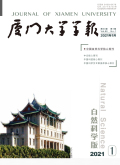厦门大学学报(自然科学版)2024,Vol.63Issue(1):13-23,11.DOI:10.6043/j.issn.0438-0479.202207014
人工智能在经导管动脉化疗栓塞术治疗肝细胞癌的预后和疗效预测中的应用进展
Application progress of artificial intelligence in prognosis and therapeutic effect prediction of hepatocellular carcinoma by transcatheter arterial chemoembolization
摘要
Abstract
[Background]Transcatheter arterial chemoembolization(TACE)stands as one of the main treatment methods for hepatocellular carcinoma(HCC).Individual differences of patients require doctors to prioritize individualized strategies based on standardized treatment.Although a high-precision postoperative TACE prediction model can assist doctors in formulating clinical treatment plans for HCC patients,there remains a lack of consensus on the biological indicators for predicting TACE outcomes.The alternative prognostic features of TACE include clinical,biochemical,and imaging omics features,which are high-dimensional and complicated and are mostly analyzed using artificial intelligence(AI)algorithms.[Progress]This paper reviews the application of AI in TACE prognosis prediction from four key perspectives:region of interest segmentation,feature extraction,feature selection,and model construction.Currently,region-of-interest segmentation mainly employs a UNet-like model,yet the segmentation accuracy varies widely across studies.The segmentation accuracy of the same model differs between various tasks and datasets from different centers.According to different feature acquisition approaches,prognostic prediction features can be divided into non-radiomics features and radiomics features.The former uses texture analysis techniques to extract image features such as shape features and texture features.The latter mainly uses convolutional neural networks(CNNs)to extract deep learning features from images and can directly output prediction results.The methods for filtering features can be divided into feature reduction and feature selection.Feature reduction compresses high-dimensional features into low-dimensional features.Although the key information in the features is preserved,this feature dimension reduction method is relatively less interpretable and thus less used.Feature selection includes filter,wrapper,and embedded methods.In current research,filtering and embedding methods are mainly used to filter features.The former can directly calculate the importance of features but with low accuracy,as revealed in the Pearson coefficient.The latter has higher accuracy but is relatively slow,as examplified by least absolute shrinkage and selection operator(LASSO).The prognostic models are mainly based on machine learning models because machine learning models can integrate various factors.Since CNNs can directly extract features from images and generate prediction results,studies also use CNNs as prediction models.However,CNNs can only use images as input and cannot incorporate other relevant factors,making them less frequently used as prediction models.In addition,there are also studies predicting TACE prognosis using a nomogram after extracting features through deep learning or machine learning methods.[Perspective]With the concept of precision medicine,individual differences are increasingly emphasized in the development of TACE treatment plans.AI is increasingly utilized in studies to analyze individual differences in patients.Fully automatic segmentation methods based on deep learning can outline regions of interest in large batches at low cost,presenting a more promising method.The current state-of-the-art segmentation models are mainly based on the Transformer module,suggesting that using the Transformer module-based segmentation model may be able to outline the region of interest more accurately.Radiomics initially extracts high-throughput features and then selects features later,requiring substantial manual intervention in the middle process and impacting feature quality.CNNs can more directly extract image features from images with predefined dimensions and mine deep semantic features from images,making them a more effective method for image feature extraction.Since shallow machine learning models,such as ANNs,can fuse qualitative and quantitative features other than image features,they are widely used as prediction models for TACE prognosis.Currently,due to data format constraints,only CNNs are suitable as prediction models to directly predict patients'TACE prognosis from images.Thus,the development of relevant prognostic models based on deep learning techniques has considerably contributed to prognostic prediction models.关键词
肝细胞癌/经导管动脉化疗栓塞术/预后预测/疗效预测/人工智能Key words
hepatocellular carcinoma/transcatheter arterial chemoembolization/prognosis prediction/therapeutic effect prediction/artificial intelligence分类
医药卫生引用本文复制引用
王侃琦,毛景松,赵扬,刘刚..人工智能在经导管动脉化疗栓塞术治疗肝细胞癌的预后和疗效预测中的应用进展[J].厦门大学学报(自然科学版),2024,63(1):13-23,11.基金项目
国家重点研发计划(2023YFβ3810003) (2023YFβ3810003)
国家自然科学基金杰出青年基金(81925019) (81925019)
广东省基础与应用基础研究基金(2021A1515012462) (2021A1515012462)

